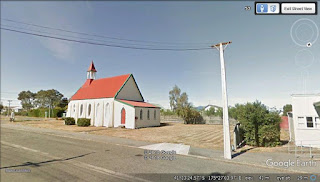On a trip with his horse Lochie, Rev John Ross visited the
McLeod brothers William and James.
“It was known that more settlers had taken up
land in the vast hinterland in the south and I longed to visit and minister to
them. I had heard that there was bush to penetrate, creeks to ford, and rivers
which were often swollen by heavy rain. When I did journey forth, my horse
Lochie became my faithful fellow worker.
Lochie was magnificent
assisting me negotiating the narrow and often dangerous track which threaded
its way through the steep wooded hills and along sharp ridges, and so it was
late when I arrived at Whakapuni.
Nevertheless, Mr and Mrs William McLeod
accorded me the hospitality so characteristic of the hardy pioneers. They were
anxious for news of Masterton and the settlers there. Together we gave thanks
to God for bringing us to this land and this day.
Next morning Mr McLeod advised
me to rest Lochie, saddle up one of his horses, and proceed forthwith to White
Rock. Should the weather close in and a storm develop in the rugged terrain it
would be disastrous. I knew I could fend for myself and that I was not
unaccustomed to sleeping in the open, but I perceived Mr McLeod’s advice should
not be disregarded.
As I wended my way along the
river, bush and terraces clothed in virgin grass I marvelled at the stark
contrast with my native Scotland.
Habitation was indeed sparse.
Along the coast station holders and station hands alike spoke of the hardships,
the loneliness, and the work that sapped their energy but not their spirit of
adventure and freedom present in this new country.
Distances between settlers
caused me to spend more time travelling than I had realised would be necessary.
And on the first day of my return journey, the weather changed and it began to
rain. As it increased I turned up a narrow track into the bush to seek shelter.
Fortuitously the track led me to an abandoned native hut. It was three days
before the storm abated and I was able to continue on my way – damp, cold and
hungry!
After a day’s rest I was eager
to continue my journey to locate the Cameron brothers, and Mr McLeod’s brother
James. It was a long ride eastwards before we sidled down the last steep hill
into the Pahaoa Valley.
I made contact with Mr James
McLeod further up the Valley where he was managing his uncle, Alexander
Sutherland’s land. Mr McLeod was quick to observe and comment. He jokingly
referred to Lochie as my “Scottish steed”! He related how in the early days,
Maoris formed the trails into the Valley whereby they came each year to snare
birds, trap eels and gather flax.
When I bade farewell I prayed
that the families, through their isolation, would never lose their faith – the
faith of their fathers and the inheritance their father’s had given them. …
I believe a church will be
established in this region. A place of worship loyal to the Word of God and
forever faithful in the future.”
 |
| Rev John Ross |
Extracts from records of the Reverend John Ross who arrived
in New Zealand (newly ordained in Caithness of the Free Church of Scotland) in 1867 to
establish a church in the Martinborough area (then known as Waihinga).
Founders of the Martinborough Presbyterian Church
There were some very forward-thinking, conscientious
Scottish Christian folk about in the South Wairarapa in those days. A group of
them gathered on the banks of the Ruamahanga to discuss what could be done
about establishing a place of worship in this new settlement. They were William
and James McLeod, David Oliver, James McMaster, William Smith, George Hanlon,
Allan Cameron and Robert Wilson.
Later a deputation met the Hon. Mr Waterhouse to procure
land for the church and manse site. That same year, June 1871, a church was
built.
By the 1880s a larger church was necessary. More land was purchased and a
new church was built in 1891. In 1896 the old church was moved to the rear of
the new building to become the vestry.
 |
| Martinborough Presbyterian church 2018 |
The Martinborough Presbyterian Church recorded:
James McLeod was of a more cheerful disposition than his
brother. He married Alexander Sutherland’s daughter, Catherine and they had 11
children. James managed ‘Ngaipu’ at Hinakura, as it is now known. He retired to
Martinborough in 1875 and built a house which they named ‘The Gums’ on account
of the large stand of gum trees on the property. This house still stands at 54
Dublin Street.
 |
| James McLeod |
 |
| Catherine McLeod |
On the death of James McLeod at the age of 83 the
Martinborough Presbyterian Church Session recorded their deep appreciation of
the long and faithful services given to the church by the late James McLeod for
over 30 years as an elder who took the keenest interest and most active part in
the church. He and his brother William were the founders of the church 51 years
ago and during all that time he was the Treasurer until within a few months of
his death.
Source:
Booklet: Celebrating 135 Years Presbyterian Church in this area in Martinborough 2006.











